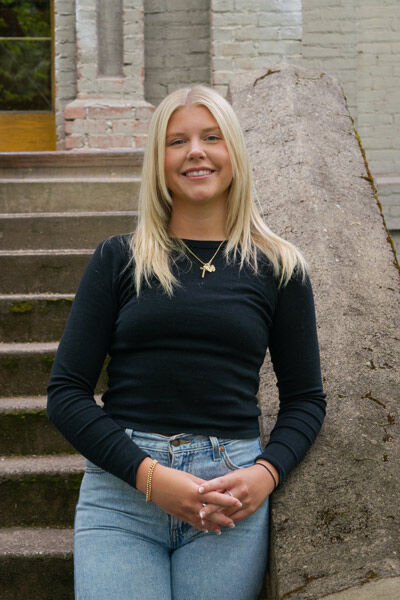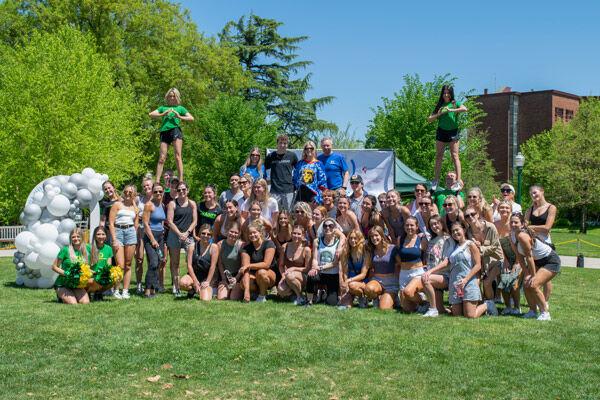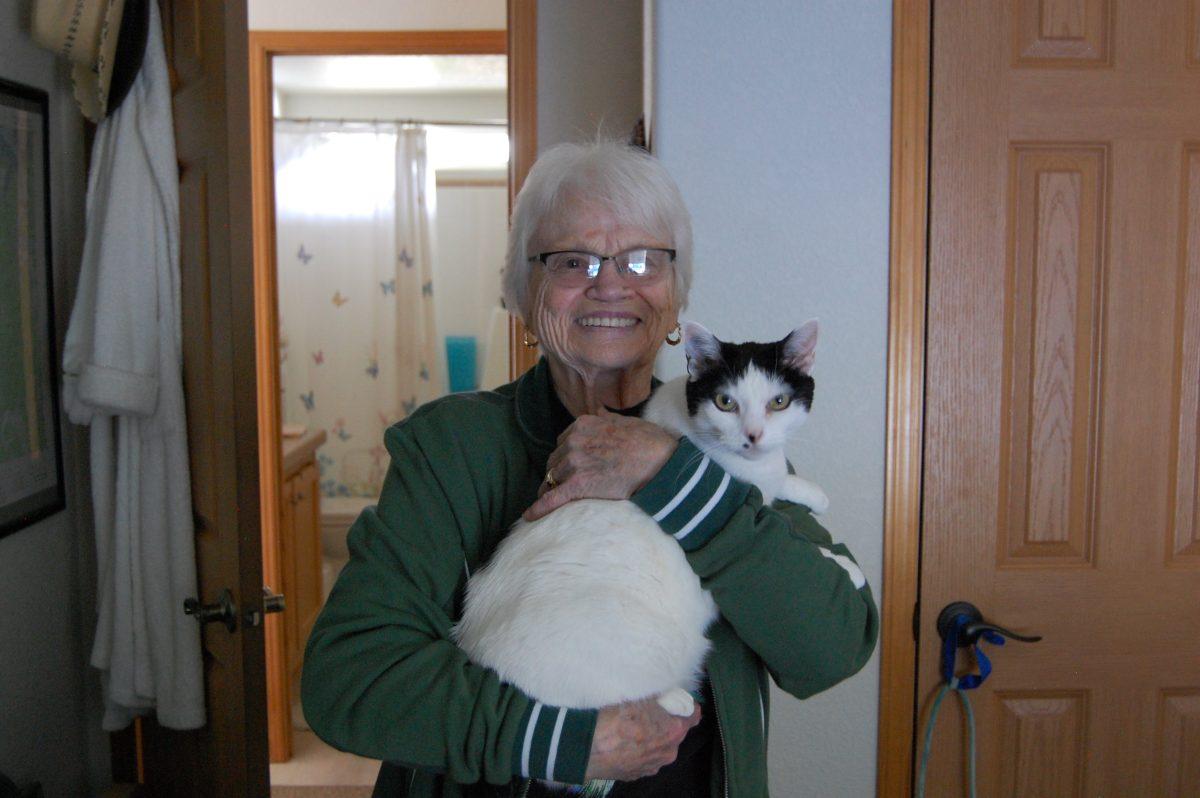In third grade, Catie Cooper was sat down by her parents. They explained to her that her mother, Carrie Cooper, was sick and would not be getting better. At the time, Catie did not understand what her parents were saying and how it would affect her mother.
Carrie was diagnosed with Huntington’s disease at the age of 33.
“She was always the life of the party and always the happiest person in the room,” Catie says. “I think that is where I got my spark from.”
Despite the hardships, Carrie continued to make jokes throughout her fight with Huntington’s disease. She died on March 23, 2022.
Today, Catie is a sophomore at the University of Oregon studying public relations. Catie has been working for the last three months with the Huntington’s Disease Society of America, planning HIIT Huntington’s Disease Back, an event to raise money for research of the disease.
Huntington’s disease is an inherited genetic disorder affecting one in every 10,000 to 20,000 people. Huntington’s disease causes neurons in parts of the brain to break down and die.
“The hard part with Huntington’s is that it does eat away at your brain,” Catie says.“It doesn’t really take your spark away, but it did affect her movements and her ability to make cognitive decisions.”
According to the National Institute of Neurological Disorders and Stroke, when a person has Huntington’s disease, there is a 50% chance it will be passed down to their children. As of 2023, Huntington’s does not have any cure or treatment to stop the disease from getting worse. However, support and treatment can help people with Huntington’s deal with some of the issues the disease can cause.
”With Carrie, she got to a point where she really was just homebound,” says Mark Cooper, Catie’s father. Huntington’s is a life-changing disease, and “a patient will get to some point where they can’t drive, it’s hard for them to go out, they can’t go to dinner, they can’t go to a movie anymore,” Mark says. “So really, their world shrinks and as that shrinks, there really is nobody on the outside that knows what is going on.”
Carrie’s death “got the ball rolling for me to bring awareness,” Catie says. Outside of fundraising, Cooper has been a part of multiple events to spread awareness, but HIIT Huntington’s Disease Back is her first time taking the lead.
“I’m dipping my toe into the water and I’m hoping that this can be an annual event,” Catie says.
After months of work, Catie’s event took place on May 13, on the EMU green at the UO. HIIT Huntington’s Disease Back is a high-intensity interval training, or HIIT, class paired with a silent auction and raffle to raise money. A few of the raffle items included a certificate to the Oakway Golf course, a PR package from Jordyn Mannino, a basket of snacks from Lone Oak Assisted Living and a 10 class pass from Glow Yoga. Some of the groups supporting the event include The Huntington’s Disease Society of America, Expert Surplus, Bubble Social Balloons and the UO’s chapter of the Sorority Alpha Phi.
Catie is not the only member of the Cooper family doing this kind of work. Catie’s older brother, Jack Cooper, planned an event with the Huntington’s Disease Society to raise awareness in January 2022. This event took place at Jack Cooper’s college, King’s College in Pittston, Pennsylvania. The King’s College men’s ice hockey team hosted a Huntington’s Disease Awareness night including contests and a raffle, and all proceeds from the event went to the Huntington’s Disease Society. After Jack’s event with the Huntington’s Disease Society, Catie was inspired to put on her own event at the UO.
“I saw the turnout on that,” Catie says, “and how big an event like this could be.”
Planning the HIIT Huntington’s Disease Back event took about three months. Catie says reaching out to possible sponsors and people in the community felt like a full-time job.
“Everyday I am on calls and emailing people,” Catie said before the event. She says balancing her role in planning the event and school work as a full-time public relations student at the UO was “very stressful, but it’s very exciting.”
All of the advertisements for the event were designed by Catie herself. She is also responsible for making the posters and social media for HIIT Huntington’s Disease Back. Additionally, she produced and wrote a script for a video talking about her event and the cause she is supporting.
“It is a really emotional and passionate fight with Huntington’s,” Catie says, and that is why she is “ doing everything that I am doing, and same with my brother and his event.”
HIIT Huntington’s Disease Back started with a speech from Catie herself about the different activities and ways to raise money at her event. Catie thanked everyone for being there and introduced the HIIT instructors for the main event, Hailey Madsen and Ashley Van Goorden. Madsen and Van Gooren then led people through a 30 minute HIIT class while others participated in the silent auction and 50/50 raffle.
Mark was in attendance to show support for the event and says he is very proud of his children. He believes that with this kind of passion, change is possible for this disease.
“There is a cure in my kids’ lifetime,” Mark says, “But there wasn’t in my wife’s.”
Catie hopes to use the skills she has gained planning HIIT Huntington’s Disease Back to continue to plan more events for nonprofits.
“I am going to be really sad that it is over,” Catie says, “and I won’t have something to put my passion into.”
Because of her work with the Huntington’s Disease Society planning HIIT Huntington’s Back, Catie has a new opportunity to spread awareness this fall.
“I am on the board for a Portland Hope Walk in September,” Catie says, “so I’m now working with HDSA [Huntington’s Disease Society of America] to get that going.” The Team Hope Walk is the largest fundraising event put on by the Huntington’s Disease Society. The walk takes place nationally in over 100 cities as of 2022. According to the Huntington’s Disease Society, the event has raised over $20 million since it started in 2007.
Catie plans to continue to use her voice to help other children who have lost a parent to Huntington’s disease feel seen and spread awareness for the disease. While she doesn’t want to be a “spokesperson” for Huntington’s, she wants to use her voice and “whatever little platform” she has for good.
“I am kind of just trying to be a voice for other kids that are in my position,” she says.
The Cooper family poses on stage surrounded by the attendees of Cooper’s HIIT event.











![[Photo Courtesy of the Lara Family]
Ruben embraces his beloved childhood goat, Katrina.](https://ethos.dailyemerald.com/wp-content/uploads/2025/05/katrina-1-1060x1200.jpg)


